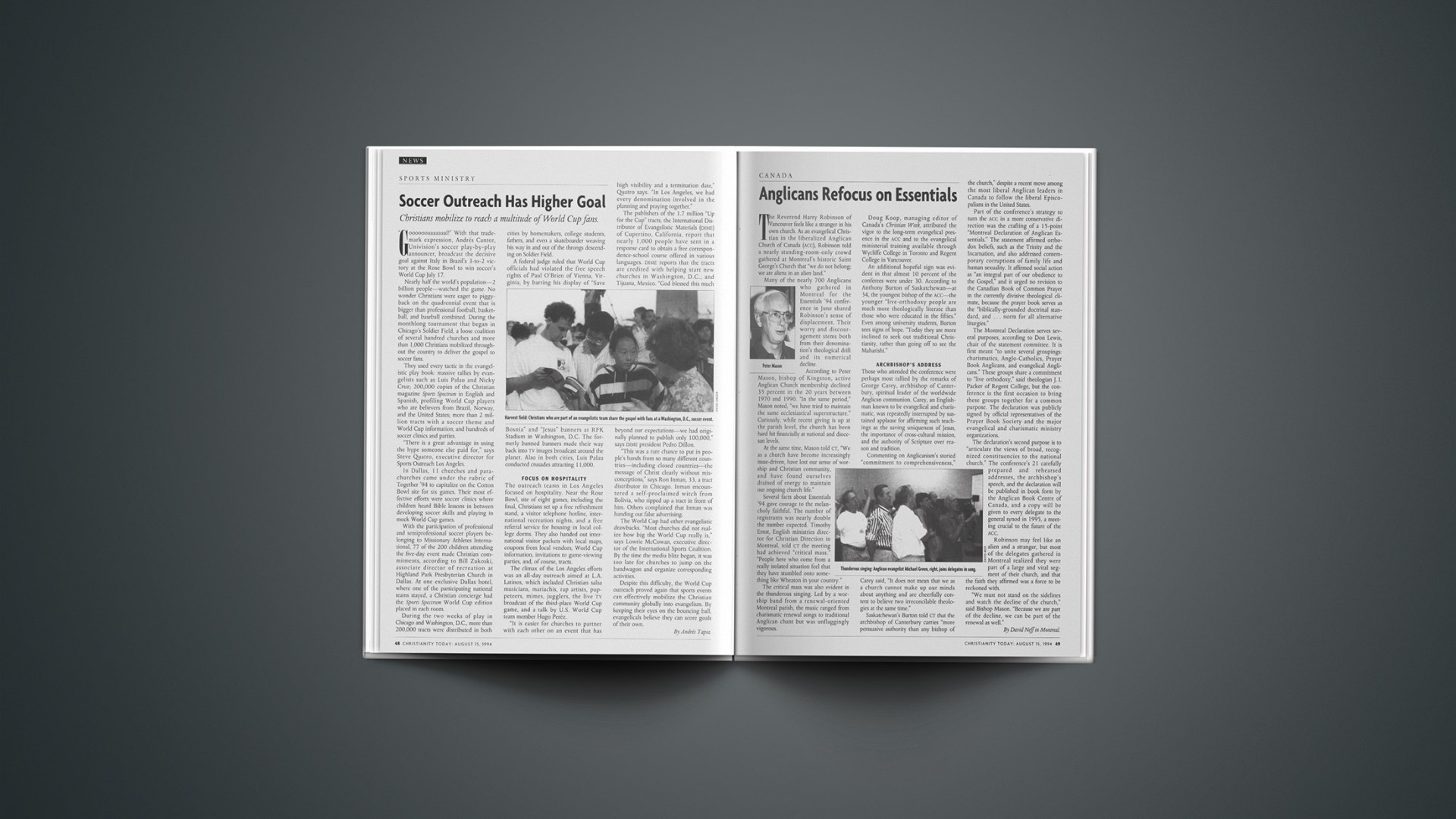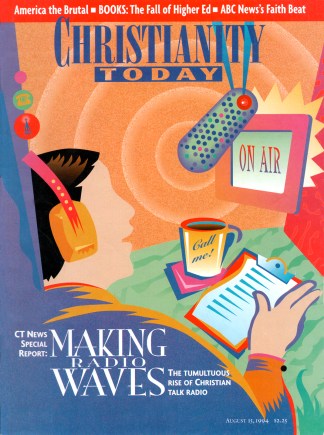Christians mobilize to reach a multitude of World Cup fans.
“Gooooooaaaaaaal!” With that trademark expression, Andras Cantor, Univision’s soccer play-by-play announcer, broadcast the decisive goal against Italy in Brazil’s 3-to-2 victory at the Rose Bowl to win soccer’s World Cup July 17.
Nearly half the world’s population—2 billion people—watched the game. No wonder Christians were eager to piggyback on the quadrennial event that is bigger than professional football, basketball, and baseball combined. During the monthlong tournament that began in Chicago’s Soldier Field, a loose coalition of several hundred churches and more than 1,000 Christians mobilized throughout the country to deliver the gospel to soccer fans.
They used every tactic in the evangelistic play book: massive rallies by evangelists such as Luis Palau and Nicky Cruz; 200,000 copies of the Christian magazine Sports Spectrum in English and Spanish, profiling World Cup players who are believers from Brazil, Norway, and the United States; more than 2 million tracts with a soccer theme and World Cup information; and hundreds of soccer clinics and parties.
“There is a great advantage in using the hype someone else paid for,” says Steve Quatro, executive director for Sports Outreach Los Angeles.
In Dallas, 11 churches and parachurches came under the rubric of Together ’94 to capitalize on the Cotton Bowl site for six games. Their most effective efforts were soccer clinics where children heard Bible lessons in between developing soccer skills and playing in mock World Cup games.
With the participation of professional and semiprofessional soccer players belonging to Missionary Athletes International, 77 of the 200 children attending the five-day event made Christian commitments, according to Bill Zukoski, associate director of recreation at Highland Park Presbyterian Church in Dallas. At one exclusive Dallas hotel, where one of the participating national teams stayed, a Christian concierge had the Sports Spectrum World Cup edition placed in each room.
During the two weeks of play in Chicago and Washington, D.C., more than 200,000 tracts were distributed in both cities by homemakers, college students, fathers, and even a skateboarder weaving his way in and out of the throngs descending on Soldier Field.
A federal judge ruled that World Cup officials had violated the free speech rights of Paul O’Brien of Vienna, Virginia, by barring his display of “Save Bosnia” and “Jesus” banners at RFK Stadium in Washington, D.C. The formerly banned banners made their way back into TV images broadcast around the planet. Also in both cities, Luis Palau conducted crusades attracting 11,000.
FOCUS ON HOSPITALITY
The outreach teams in Los Angeles focused on hospitality. Near the Rose Bowl, site of eight games, including the final, Christians set up a free refreshment stand, a visitor telephone hotline, international recreation nights, and a free referral service for housing in local college dorms. They also handed out international visitor packets with local maps, coupons from local vendors, World Cup information, invitations to game-viewing parties, and, of course, tracts.
The climax of the Los Angeles efforts was an all-day outreach aimed at L.A. Latinos, which included Christian salsa musicians, mariachis, rap artists, puppeteers, mimes, jugglers, the live TV broadcast of the third-place World Cup game, and a talk by U.S. World Cup team member Hugo Peraz.
“It is easier for churches to partner with each other on an event that has high visibility and a termination date,” Quatro says. “In Los Angeles, we had every denomination involved in the planning and praying together.”
The publishers of the 1.7 million “Up for the Cup” tracts, the International Distributor of Evangelistic Materials (dime) of Cupertino, California, report that nearly 1,000 people have sent in a response card to obtain a free correspondence-school course offered in various languages. dime reports that the tracts are credited with helping start new churches in Washington, D.C., and Tijuana, Mexico. “God blessed this much beyond our expectations—we had originally planned to publish only 100,000,” says dime president Pedro Dillon.
“This was a rare chance to put in people’s hands from so many different countries—including closed countries—the message of Christ clearly without misconceptions,” says Ron Inman, 33, a tract distributor in Chicago. Inman encountered a self-proclaimed witch from Bolivia, who ripped up a tract in front of him. Others complained that Inman was handing out false advertising.
The World Cup had other evangelistic drawbacks. “Most churches did not realize how big the World Cup really is,” says Lowrie McCowan, executive director of the International Sports Coalition. By the time the media blitz began, it was too late for churches to jump on the bandwagon and organize corresponding activities.
Despite this difficulty, the World Cup outreach proved again that sports events can effectively mobilize the Christian community globally into evangelism. By keeping their eyes on the bouncing ball, evangelicals believe they can score goals of their own.
Copyright © 1994 Christianity Today. Click for reprint information.










